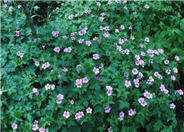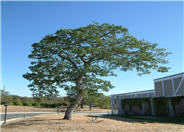
Common name:Coast Redwood, Redwood
Botanical name:Sequoia sempervirens
This fast-growing, aromatic tree has soft, dark green foliage with long needles appearing in flat sprays and brown, barrel-shaped cones that appear after 1 year. Its soft, red-brown bark is fiberous and furrowed. Particularly after mechanical damage, this tree will stump sprout to form new, young trees around the stump. Avoid planting in areas of high foot traffic. Inadequate moisture or a hot, dry site will inhibit its growth.

Common name:Powis Castle Artemisia
Botanical name:Artemisia 'Powis Castle'
This mounding shrub reaches 3 ft. high and up to 5ft. wide with fine silver foliage. It does well in coastal areas as well as inland warm areas. It rarely blooms but is used for its beautiful foliage. It is striking next to perennials with bright colors. This shrub prefers full sun and well draining soil. It is drought tolerant once it's established.

Common name:Endress' Cranesbill
Botanical name:Geranium endressii
This handsome perennial, used a ground cover, has evergreen dark green, veined and glossy leaves, Small pink, cup shaped flowers bloom in spring and summer. This plant reaches 1'-1.5' tall and spreads 2'-4' wide. Shear plant when first blooms fade, in order to encourage more blooms. It prefers full to part sun, with well draining soil.

Common name:Blue Oak
Botanical name:Quercus douglasii
Blue Oak is a deciduous tree that has a slow growth rate and reaches 30'-50' tall. It develops 2" long, lobed blue-green leaves. Blue Oak is very drought tolerant, is native to California and attracts butterflies. Because of its slow growth, it can be used for bonsai. Flowers are insignificant. Acorns were used by California Natives for food.

Common name:Endress' Cranesbill
Botanical name:Geranium endressii
This handsome perennial, used a ground cover, has evergreen dark green, veined and glossy leaves, Small pink, cup shaped flowers bloom in spring and summer. This plant reaches 1'-1.5' tall and spreads 2'-4' wide. Shear plant when first blooms fade, in order to encourage more blooms. It prefers full to part sun, with well draining soil.
| Designer: Cooperative Extension | Lush Beds |
Photographer: GardenSoft |
Soils and Compost:
Maintain a two to four inch layer of mulch on the soil surface to reduce weeds, infiltrate rain water, and reduce compaction.
Water Saving Tip:
Check the soil's moisture level before watering.
You can reduce your water use 20-50% by regularly checking the soil before watering.
Integrated Pest Management:
Develop healthy soil for plants that are vigorous and naturally pest-resistant.
